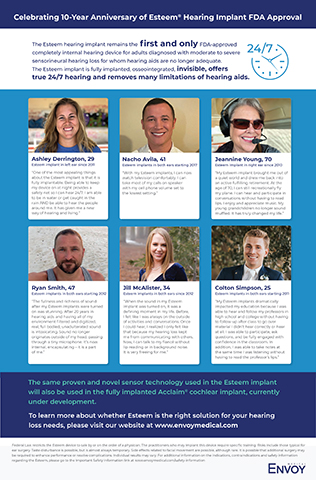Envoy Medical Receives FDA Breakthrough Device Designation for its Fully Implanted Acclaim® Cochlear Implant
Envoy Medical Receives FDA Breakthrough Device Designation for its Fully Implanted Acclaim® Cochlear Implant
Also Celebrates 10-Year Anniversary of Invisible Hearing with Esteem® FDA Approval
WHITE BEAR LAKE, Minn.--(BUSINESS WIRE)--Envoy Medical® Corporation, a hearing health company focused on providing innovative technologies across the hearing loss spectrum, today announced that its fully implanted Acclaim® cochlear implant was granted the Breakthrough Device Designation from the U.S. Food and Drug Administration (FDA). Unlike existing traditional cochlear implants that are partially implanted and have an external microphone and processor, if approved by the FDA, the Acclaim would be the first-of-its-kind cochlear implant without any external components to offer unique benefits to users and hopefully increase cochlear implant adoption and user compliance across the globe.
“Patients with significant hearing loss want to hear better but many delay or avoid taking advantage of cochlear implant technology altogether in part because of the required external components,” said Dr. Colin Driscoll, MD, practicing neurotologist and chair of the department of otolaryngology – head and neck surgery at Mayo Clinic in Minnesota. “I am thrilled to see the progress being made by Envoy Medical on the Acclaim cochlear implant because a fully implantable device eliminates this barrier and in addition delivers hearing all the time, day and night. It could be like getting your hearing back.”
Envoy Medical is also celebrating 10 years since FDA approval of its fully implanted Esteem® osseointegrated active middle ear implant (AMEI) for adults diagnosed with moderate to severe sensorineural hearing loss. The fully implanted Acclaim cochlear implant leverages the novel sensor technology from the Esteem osseointegrated AMEI. Over a decade’s worth of performance and reliability data continue to validate Envoy Medical’s sensor as the current “gold standard” for fully implanted hearing implants. Designed to overcome the limitations of current hearing devices that rely on external devices and microphones, Envoy Medical’s novel sensor leverages the natural anatomy of the ear to capture sound and convert it into electrical signals that are used by the implant to address hearing loss.
“Our unique sensor remains a disruptive platform technology that allows us to excel in the development of fully implanted hearing devices, which we believe offer unique benefits and improvements over traditional hearing devices with external components,” said Brent Lucas, CEO of Envoy Medical. “Receiving the Breakthrough Device Designation for our fully implanted Acclaim cochlear implant was an important milestone, one that will help us bring our device to people as quickly and efficiently as we can, and a meaningful testament to the incredible amount of complex work being done by our small but incredibly talented and focused team. We are humbled by the opportunity to make our living by improving the lives of people suffering from debilitating hearing loss, and we look forward to helping audiologists and physicians bring more hearing, to more people, more of the time.”
The FDA Breakthrough Devices Program was implemented to expedite the development and review process for medical devices that offer new technology for patients with life-threatening or irreversibly debilitating conditions. This program is designed to ensure patients and healthcare providers have more timely access to vital devices.
Hearing loss affects 48 million Americans, and is the third most prevalent health condition in older adults. Of the estimated 1.4 to four million potential users in the United States who could benefit from cochlear implants, only five percent of eligible candidates use cochlear implants.1 Potential adult recipients often wait longer than they should to get existing partially implanted cochlear implants and the reason cited most often is the visibility and amount of external hardware.2
About the Fully Implanted Acclaim® Cochlear Implant
The fully implanted Acclaim® cochlear implant is a first-of-its-kind cochlear implant designed to improve the hearing of adults diagnosed with moderate to profound sensorineural hearing loss. The Acclaim cochlear implant leverages the proven and novel sensor technology from the fully implanted Esteem® osseointegrated active middle ear implant. If approved by the FDA, it will offer the benefits of traditional partially implanted cochlear implants without the external components and associated disadvantages.
CAUTION Investigational device. Limited by United States law to investigational use.
About the Fully Implanted Esteem® Osseointegrated Active Middle Ear Implant
The fully implanted Esteem® osseointegrated active middle ear implant (AMEI) is the only FDA approved, completely internal hearing device designed to improve the hearing of adults diagnosed with moderate to severe sensorineural hearing loss. Instead of a microphone, the Esteem osseointegrated AMEI uses a novel sensor to leverage the natural anatomy of the ear to capture sound and convert it into electrical signals that are used by the implant to address hearing loss. The Esteem hearing implant is invisible and offers true 24/7 hearing, removing many limitations of hearing aids. Esteem is available in the U.S. It is not currently covered by Medicare or Medicaid, and is not widely covered by private insurers. To learn more about Esteem, visit https://www.envoymedical.com/middle-ear-implants.
About Envoy Medical Corporation
Envoy Medical Corporation, headquartered in White Bear Lake, Minnesota, is a privately held hearing health company focused on providing innovative technologies across the hearing loss spectrum. Envoy Medical has pioneered one-of-a-kind, fully implanted devices for hearing loss, including its fully implanted Esteem® osseointegrated active middle ear implant, commercially available in the U.S. since 2010, and the fully implanted Acclaim® cochlear implant, an investigational device. Envoy Medical is dedicated to pushing hearing technology beyond the status quo to improve access, usability, compliance and ultimately quality of life. For more information, please visit: www.envoymedical.com.
__________________
1 Cochlear Implant Candidacy for Adults. https://www.acialliance.org/page/AdultCandidacy
2 Barnett, M. et al. Factors involved in access and utilization of adult hearing healthcare: A systematic review. Laryngoscope (2017). doi:10.1002/lary.26234
Contacts
Joyce Ip
Merryman Communications
joyce@merrymancommunications.com
760.889.0438

